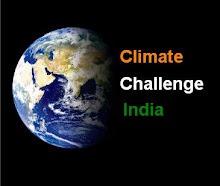There are some simple things we can each do to reduce our impact on the environment... and therefore, on climate change. I admit that I practice several, but not all. Not yet. I am trying to get there. So, don't think I am preaching to you from on high! It is merely a question of reminding ourselves to do these things. And then following through.
It is important not to feel disheartened when we catch ourselves not having done what we ought to. Or having done what we ought not to. More importantly, we need to persevere.
But first, a small story.
On a beach, a boy was busily throwing things into the sea. An elderly man was on his walk. He saw this boy and asked him what he was doing. The boy said, "I am throwing these stranded jellyfish back into the sea so they can live." The elderly man chuckled and said, "There are millions of such jelly fish on the beach! Are you gonna throw each of them back? Get real, sonny. You can't save all the jellyfish." The boy smiled and said, "Well, I made a difference for that one jellyfish!"
We cannot, individually, change the world or the way it acts. But individual actions add up. If there are no individual actions, there is no global action.
So, here are some things we can do to be 'climate-affirmative.' For each one, I also give you my own confession -- to what extent I am or am not following these.
Use fewer utensils when eating at restaurants. This means less water consumed in washing the utensils. The water supply involves a lot of non-gravity energy and this energy use pollutes the atmosphere. Restaurants are places where we can reduce our impact. Here are some examples:
Order roti and curry. They serve the roti on a small plate, give you the curry in a bowl of somd kind, and a larger plate to eat the two from. Return the larger plate. It is un-necessary. Take the roti from the small plate, dip into the curry in the bowl and eat.
You go to a buffet meal. Use the same plate for every helping. (Just make sure nothing from your plate spills into any of the food on the buffet table!)
- At a hole-in-the-wall eatery ("darshini" as it is often called), you order 1 plate idli, 1 khara bhath? You take a pair of spoons for the idli? Use the same spoons for the khara bhath.My status: Practice this 98% of the time.
- Fewer plastic bags while shopping. Even the small department stores will pack different things in different small plastic bags. If you MUST have a plastic bag to carry your shopping items, you can ask them to put everything in one bag. (Of course, you don't mix the packet of bleaching powder with the palak in the same bag :-) ) When you shop for vegetables/fruits at supermarkets, they put each in a different plastic bag (tomatoes in in one, oranges in another, etc) so that it is convenient to weigh and put a price sticker on it. You can weigh the vegetables/fruits without a plastic bag, get the price sticker printed, and put as many kinds of vegetables/fruits as you can into one plastic bag. Small saving, but remember, it all adds up eventually. We have to do our bit.
My status: Practice this 99% of the time. - Take a bus rather than a private vehicle or auto or taxi. This is a difficult one. In many cities in India, certainly in Bangalore, despite reasonably good public transport systems, it takes a lot of time to do more than one thing on a trip. So we end up taking an auto/taxi to the precise point where we need to go. But if we can afford a little time, and if the discomfort is reasonably low, it would be better to take public transportation. Using public transportation takes some effort and is not best suited for everyone (e.g.: the elderly, physically challenged, etc.). More vehicles used = more pollutants put out = negative impact on clime. My status: I rarely practice this. Shame on me! I will try to change.
- Leaving lights and other electrical appliances on even when unnecessary. This is largely a matter of habit! When we are the last person to leave the office or room or whatever, we really should turn off the appliances that are not needed. This can be, and has to be, learned. We can form "nag treaties" -- we all agree to nag each other about leaving things on even when they should not be on. If this does not work, escalate it to fines. But fines can become too easy -- i will leave the lights on, what is the fine? 5 rupees? Here you go! Even whole nations want to do this at a global level (more on that in a future blog).My status: Practice this about 75% of the time. A LOT of room for improvement.
Ultimately, it has to be a matter of pride for each of us that we are 'climate-affirmative' -- that is, we act in ways that lead to lower environmental impacts.
What are other practices you would recommend? What is your own status on each of these?
Write them in the comment box below or email them to me at chandra at csmworld dot org.
See you next week!
"Shabhaash, India !"
Saalumarada Thimmakka
"What does a barren woman know of the pain of childbirth?”
Such insults are even today thrown at childless women in our culture.
Thimmakka (of Hulikal, Magadi, Karnataka) suffered this, too.
But she showed ‘em! How?
She planted roadside trees and nurtured them as her own children.
She cared! She acted! She made a difference!
So should we!
(Image courtesy: www.indiamentoring.com)



No comments:
Post a Comment